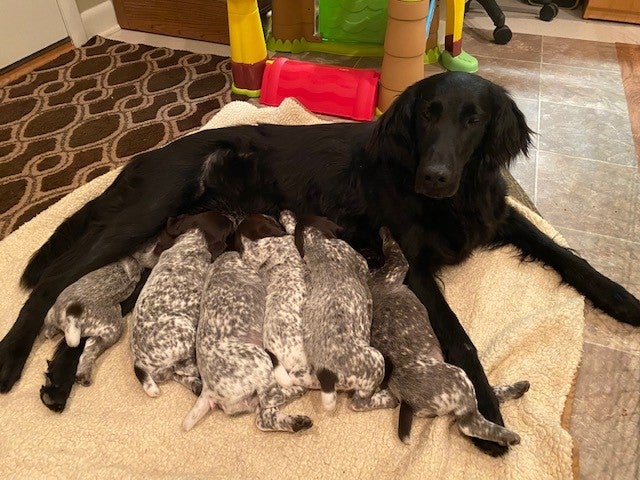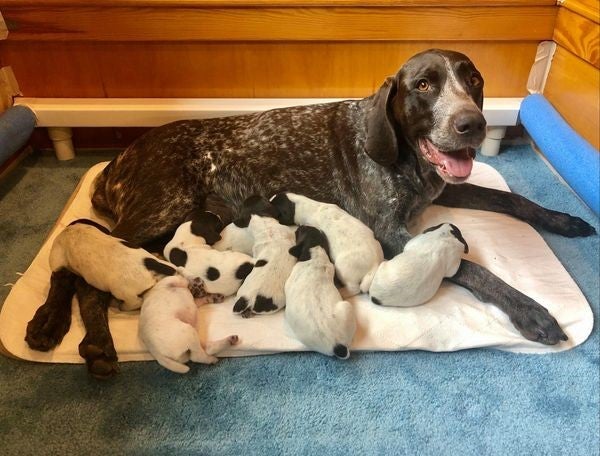
After delivering a single stillborn puppy, Foxy became frantic.
The Flat-coated Retriever believed her puppies were lost and looked for them constantly. It was a sad scene for her owner Anya Dornak.
“I would have to take her out on leash because she would get into the bushes and dig and would not come,” the Virginia resident said. “You could feel the stress coming off her.”
About 130 miles south, Ann Carter was having a breeding problem of a different type.
Her 4-year-old German Shorthaired Pointer, Cotton, delivered her first litter of 16 puppies and could not properly nurse the mammoth-size litter. Carter tried to supplement the puppies without success.
“We tried multiple bottles and nipple holes, but the pups were having nothing to do with them…After an unsuccessful day of trying to bottle feed, I had a sleepless night, worried about how I was going to feed these puppies and knowing the demand on Cotton would increase.”
In the meantime, Dornak sought orphaned puppies for which Foxy could act as a surrogate. Her daughter, Ashley, made a social media post about it, and a friend of Carter’s saw it and brought it to her attention. The breeders connected, and soon Dornak was on her way to North Carolina with Foxy.
“When they first arrived, Foxy was a little frantic, and I honestly wondered how this was going to work,” Carter said. “…Once we presented the puppies to her, her demeanor changed, and she started licking them and letting them nurse.”
Today, Foxy is stationed in a whelping box near Cotton, and the two happily share nursing duties.
“I am so glad Foxy came,” Carter said. “ I didn’t know how much I needed her until she was here.”

For breeders facing orphaned puppies and huge litters, a surrogate bitch can be a life saver, providing it is a good match and the breeders take steps to properly introduce substitute mother to puppies, said Dr. Kate Bremser DVM, a breeder of English Springer Spaniels.
“One of the major pros of finding a surrogate is that the puppies will have the most natural nursing experience. Learning to push through siblings and find nipples can help teach puppies about dealing with frustration, which can be an important skill later in life,” Bremser said. “It is also much less likely for them to aspirate milk into their lungs when nursing naturally versus being bottle or tube fed. There are also important immune complexes in mother’s milk that they miss out on being bottle fed.”
Here’s tips for successfully enlisting the help of a surrogate mother:
- Locating a Surrogate: The best way to find a surrogate is through your network of dog friends, Bremser said. “In my experience, this is the best way to locate a bitch of the appropriate size and temperament to be the most likely to be successful. Now with social media, it’s even easier to get the word out for your needs.”
- Choosing a Good Match: Ideally, the surrogate has puppies of a similar age or maybe a week or two older so that she is still lactating and has an abundance of the “mothering” hormones present, which helps in accepting new puppies. An approximate size match is best, but using a dam of a larger breed is also fine. “I would not suggest a significant mismatch in size such that the surrogate is much smaller than the puppies’ breed as they will likely grow rapidly enough that they will soon outstrip the surrogate’s ability to keep up with their needs,” Bremser said.
- Temperament Makes a Difference: Temperament is extremely important as the puppies learn from the dam, so using one of a solid temperament is ideal, Bremser said. It also makes living arrangements easier, said Carter, who co-owns Cotton with Samantha Wright.
“It helps that these bitches have such wonderful temperaments,” Carter said. “Foxy is treated like my own and can come and go from her room. She spends a lot of time sprawled out in the living room with the rest of the crew.”
- Introducing Surrogate to Litter: It is good to have a helper when the surrogate first meets the puppies, Bremser said. “I would first move the puppies out of the whelping box to a box or laundry basket, then bring in the surrogate. Allow her to inspect the area and have her lie down,” she said. “Then, with one person holding the surrogate on a leash, have a second person pick up one puppy and allow the surrogate to examine it. As long as she seems comfortable – sniffing, licking, gentle nosing, then try allowing that puppy to latch on and nurse. As long as that is going well, you can slowly introduce the rest of the puppies.”
Never leave a surrogate unattended with new puppies until it is clear that she is comfortable with them. It can be a good idea to put a basket muzzle on the surrogate for the initial time period as a safety measure.
“If the surrogate already has nursing puppies of her own, I would recommend doing the same thing, but introduce the new puppies one by one while she is nursing her puppies,” Bremser said. “Nursing stimulates hormone release that encourages good mothering so introducing the new puppies while she is nursing can help with acceptance.”
Even the best of surrogates may not immediately take to the puppies so be patient. Oral calcium supplement may help reduce anxiety during the adjustment, Bremser said.
- Responsibilities: The puppies’ breeder and the surrogate’s owner should come to an agreement on care and conditions before the surrogate arrives. “It is imperative that if you are borrowing a surrogate dam, that you care for her as if she was your own. The owner of the puppies should be prepared to pay any veterinary bills associated with the surrogate for the time that they need her,” Bremser said. “It is a great gift to allow your girl to go live with someone else to help raise their puppies so it should be greatly appreciated.”
- Supplementing & Splitting Time: It may be better for the puppies to be supplemented instead of nursing naturally. Benefits include controlling exactly how much pups are eating and how often, Bremser said.
“This can be especially helpful when you have a litter that needs weight gains and losses monitored closely,” she said. “You have the opportunity to use different formula recipes in case some puppies aren’t tolerating one formula or another.”
A breeder also can do a combination of bottle feeding and natural nursing, especially if a surrogate cannot live with the breeder and is not close enough to visit daily
“I know of a breeder who had a singleton puppy, and she had a friend with a singleton puppy. My friend’s dam was not particularly interested in her singleton, so they opted to bottle feed him,” Bremser said. “But they also took the pup to the other breeder’s house a few times a week to allow him to nurse on that dam and be with the other puppy. It worked out well for both parties, and both puppies grew up healthy and well adjusted.”
- Surrogates Benefit Too: For mothers who lose their puppies, becoming a surrogate can ease their grief, as well as take care of their milk supply. “While losing the puppy was not what I wanted, making the best out of a bad situation was the right thing to do,” Dornak said. “I know Foxy would have been all right eventually, but it would have been a lot of stress on her.”

